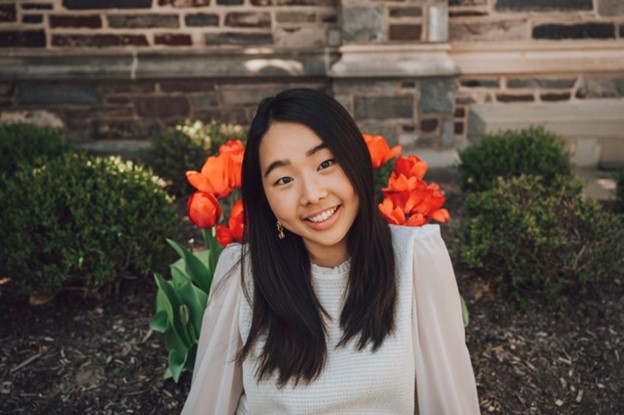
In June 2020, amidst the COVID-19 pandemic, I was diagnosed with Crohn’s disease, a form of Inflammatory Bowel Disease. Upon countless months of hospitalizations, surgeries, and treatments, discovering my chronic illness shifted the very foundations of my life as I knew it. It was only after grueling weeks of trial-and-error diagnoses by doctors that I finally learned about this disability, an invisible disease. Truth be told, the news was a shock to my family, but not for the reasons you might expect.
In my mother tongue, there is no widely accepted translation for “Crohn’s disease.” As it turns out, my Asian American identity is one reason why it took so long for me to receive my diagnosis. My gastroenterologist had not previously considered testing for a condition that is typically thought to be more common in Caucasians. From there, my innate passion for exploring the intersection between disability and Asian American identity was born.
Intersectionality, coined by Professor Kimberlé Crenshaw, acknowledges that “everyone has their own unique experiences of discrimination and oppression.” Therefore, multiple factors must be taken into consideration in any discourse surrounding public health decisions. In other words, an intersectional approach centers the priorities of historically excluded groups, such as women, people of color, immigrants, and people who identify as LGBTQ+.
The Asian Americans with Disabilities Initiative (AADI) is just one example of the emerging organizations committed to intersectionality in the nonprofit space. A youth-led 501(c)(3) nonprofit, AADI is one of the first community platforms dedicated to the intersection between disability and Asian American identity. Founded in 2021, our organization seeks to address the lack of existing resources for the Asian American and disabled community, a diverse yet vulnerable population in modern society. In turn, our initiatives focus on uplifting and amplifying Asian American voices, disabled voices, and specifically their intersection.
It is alarming that despite the ever-growing population of over two million Asian Americans that identify as disabled, a streamlined disability support platform with readily available resources specific to the Asian Pacific Islander Desi American community was lacking prior to AADI. Multiple disability support networks promote inclusion for other ethnic and racial populations such as the National Black Disability Coalition and National Coalition for Latinxs with Disabilities. It is important that communities of color are not left behind in the advancement of disability rights. As a crucial step in this fight, AADI launched the first comprehensive resource guide for disabled Asian Americans in January 2022.
The principles of disability justice recognize that we are all mutually dependent on others—that is, we are all connected in ways which we may not even acknowledge. The COVID-19 pandemic was (and continues to be) a mass disabling event that caused nearly 1.2 million people to join the disability community. Advocating for equal access remains a priority for AADI, as well as its organizational partners that are committed to amplifying the voices of disabled Asian Americans.
Disability is a universal human experience and therefore calls for a global health policy lens to truly understand its nuances. October is National Disability Employment Awareness Month, which calls for a celebration of intersectionality within the disability advocacy space. As a disabled Asian American woman, I know the importance of empowering the next generation of disabled leaders with the tools and infrastructure to combat ableism and anti-Asian racism.
Learn more about AADI. We hope that you will continue to center intersectionality in conversations surrounding public health and social justice.
Do you have a story idea for us? Do you want to submit a guest blog? If it's about equity, diversity, or inclusion, please submit to edi.stories@nih.gov.
For news, updates, and videos, subscribe or follow EDI on: Twitter, Instagram, Blog, YouTube.






